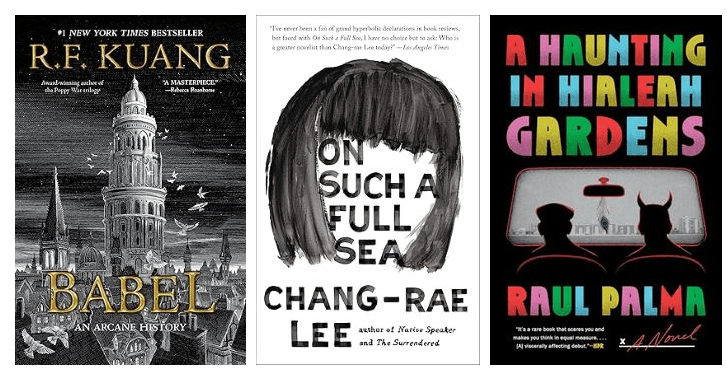Summary | Excerpt | Reviews | Beyond the Book | Read-Alikes | Genres & Themes | Author Bio

Stories
by Ruben ReyesThis article relates to There Is a Rio Grande in Heaven
In Ruben Reyes Jr.'s short story collection There Is a Rio Grande in Heaven, speculative fiction is a way to rediscover the experiences of first- and second-generation Latinx immigrants. Alternative history might commemorate the devastating effects of genocide or alienation while at the same time offering imaginative escape from them. Other authors of speculative fiction, such as Zen Cho, Ken Liu, and Brenda Peynado, use similar strategies to shed fresh light on racism and migrants' sense of exile. We spotlight a few more examples below.
 Babel by R.F. Kuang (2022) is a sweeping fantasy novel in which Robin Swift, an orphan, is taken from China to be educated at the Royal Institute of Translation at Oxford. He and his best friends—Ramy from India, Victoire from Haiti, and Letty, who is English and took her brother's place at the university—soon become inseparable. Silver bars, inscribed with matching pairs of English and foreign-language words, produce the energy that keeps the global economy going. But when the four friends learn that their translation services are keeping the poor subjugated and funding foreign wars, they must decide where their loyalties lie. Kuang, whose family moved to the United States from China when she was four years old, reveals anew, through an alternative past, the very real horrors of colonialism.
Babel by R.F. Kuang (2022) is a sweeping fantasy novel in which Robin Swift, an orphan, is taken from China to be educated at the Royal Institute of Translation at Oxford. He and his best friends—Ramy from India, Victoire from Haiti, and Letty, who is English and took her brother's place at the university—soon become inseparable. Silver bars, inscribed with matching pairs of English and foreign-language words, produce the energy that keeps the global economy going. But when the four friends learn that their translation services are keeping the poor subjugated and funding foreign wars, they must decide where their loyalties lie. Kuang, whose family moved to the United States from China when she was four years old, reveals anew, through an alternative past, the very real horrors of colonialism.
Chang-rae Lee's dystopian novel On Such a Full Sea (2014) imagines a stratified American society where only the super-rich ("Charters") have reliable access to food and healthcare. The open counties are lawless zones with no government services. In between are polluted cities like B-Mor (based on Baltimore), peopled mostly by descendants of refugees. Here citizens must work hard to produce food for export to the Charters. Social mobility is almost impossible, and fear keeps most people in their place anyway. But when her boyfriend disappears, a young woman named Fan is desperate enough to undertake a quest to the open counties to find him. Lee, who was born in South Korea and has lived in the USA since he was three, often tackles this theme of estrangement, asking how people can better their lives despite chaos or political repression.
In A Haunting in Hialeah Gardens by Raul Palma (2023), Hugo's harsh childhood working in a Bolivian silver mine contrasts with his current life in Miami. He lives in a primarily Cuban area where he feels that he doesn't belong. His loneliness is exacerbated by his wife Meli's recent death from cancer. He works as a babaláwo, or priest in the Afro-Cuban religion of Santería—even though he doesn't actually believe in it. Through his clients, though, he starts to become amenable to the supernatural. In any case, hauntings don't have to be literal: Hugo is haunted by his past, as well as by regret and grief. Palma, a second-generation Cuban American, makes it clear that, though Hugo is responsible for his own actions, the difficulties involved in migration haven't made things easy for him.
Filed under Books and Authors
![]() This article relates to There Is a Rio Grande in Heaven.
It first ran in the September 4, 2024
issue of BookBrowse Recommends.
This article relates to There Is a Rio Grande in Heaven.
It first ran in the September 4, 2024
issue of BookBrowse Recommends.
Your guide toexceptional books
BookBrowse seeks out and recommends the best in contemporary fiction and nonfiction—books that not only engage and entertain but also deepen our understanding of ourselves and the world around us.